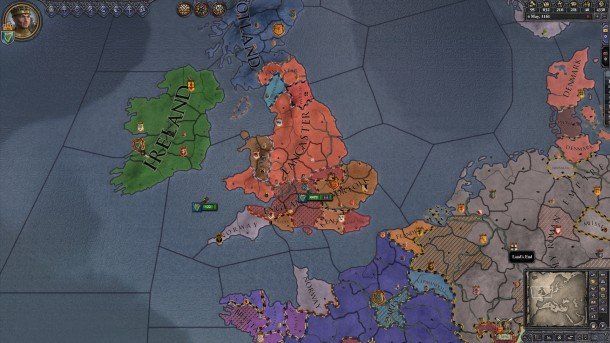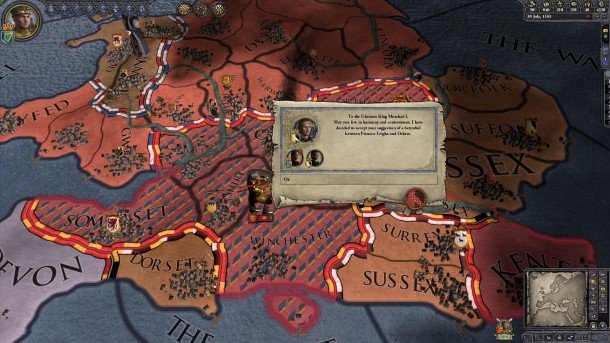
A game of thrones
It is the summer of 1160. England has been a divided realm for almost a century, ever since King Harald Hardrada of Norway died and left Norwegians, Saxons, and Normans to squabble over every inch of ground. England itself is a shadow of what it once was, occupying an area far smaller than the long-stable Duchy of Lancaster to the north.
The current English king is a distant pretender, the Saxon Gudbrand I, who claimed the throne by murdering his nephew, the boy king Enguerrand. My mother was Princess Thorborg of England, daughter of the renowned English King Magnus II, making my claim much stronger than Gudbrand's. We have just won a great victory over the Saxons at St. Pauls, but the war is far from over, and I've emptied the royal treasuries arranging a fabricated claim on Wales.
September 9, 1160: Reading, Oxford, falls to King Murchad. The plunder from the hold is used to pay back Ireland's debts.
October 13, 1160: After defeating nearly all of Gudbrad's forces in the field, King Murchad leads his men to capture Winchester.
April 20, 1161: Winchester falls. Northampton is the only county that remains in Saxon hands.
May 4, 1161: Arriving in the Northampton countryside, King Murchad discovers that Gudbrand's last bastion is already under attack by the Duke Stigand of Norfolk. The Irish liege elects to leave them to their battles, riding off to secure the smaller settlements in Oxford.
You only need to capture the "main" castle or city in any given county for it to count as occupied and, thus, slowly tick up your warscore. But capturing the smaller baronies will force my warscore up faster. And it's not like I have anything better to do.
Keep up to date with the most important stories and the best deals, as picked by the PC Gamer team.

July 12, 1161: After his victory at Northampton, Duke Stigand of Norfolk rides to join King Murchad's siege at Buckingham. To cement their friendship, a betrothal is arranged between Stigand's son and heir, Oshere, and Murchad's daughter, Princess Leigha.
King Gudbrand, as it turns out, is not well-liked by the other nobles of Britain. He has no legitimate tie to the Norwegian House Yngling that has ruled England since the time of Harald the Conqueror, whereas my mother was a bona fide Yngling princess. It makes sense that Norfolk would prefer me as their king, even if I am Irish.
April 9, 1162: All the holds in Oxford have been captured by Irish and Norfolkian forces. Duke Stigand departs to mind his own realm against counter-attack, while King Murchad continues his ride to Wiltshire.
Len Hafer is a freelancer and lifelong PC gamer with a specialty in strategy, RPGs, horror, and survival games. A chance encounter with Warcraft 2: Tides of Darkness changed her life forever. Today, her favorites include the grand strategy games from Paradox Interactive like Crusader Kings and Europa Universalis, and thought-provoking, story-rich RPGs like Persona 5 and Disco Elysium. She also loves history, hiking in the mountains of Colorado, and heavy metal music.

